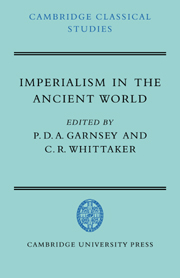Book contents
- Frontmatter
- Contents
- List of figures
- Preface
- 1 INTRODUCTION
- 2 IMPERIALISM AND EMPIRE IN NEW KINGDOM EGYPT
- 3 CARTHAGINIAN IMPERIALISM IN THE FIFTH AND FOURTH CENTURIES
- 4 SPARTAN IMPERIALISM?
- 5 THE FIFTH-CENTURY ATHENIAN EMPIRE: A BALANCE SHEET
- 6 ATHENS IN THE FOURTH CENTURY
- 7 THE ANTIGONIDS AND THE GREEK STATES, 276–196 B.C.
- 8 LAUS IMPERII
- 9 GREEK INTELLECTUALS AND THE ROMAN ARISTOCRACY IN THE FIRST CENTURY B.C.
- 10 THE BENEFICIAL IDEOLOGY
- 11 ROME's AFRICAN EMPIRE UNDER THE PRINCIPATE
- 12 JEWISH ATTITUDES TO THE ROMAN EMPIRE
- Notes
- Bibliography
- Index
1 - INTRODUCTION
Published online by Cambridge University Press: 05 June 2014
- Frontmatter
- Contents
- List of figures
- Preface
- 1 INTRODUCTION
- 2 IMPERIALISM AND EMPIRE IN NEW KINGDOM EGYPT
- 3 CARTHAGINIAN IMPERIALISM IN THE FIFTH AND FOURTH CENTURIES
- 4 SPARTAN IMPERIALISM?
- 5 THE FIFTH-CENTURY ATHENIAN EMPIRE: A BALANCE SHEET
- 6 ATHENS IN THE FOURTH CENTURY
- 7 THE ANTIGONIDS AND THE GREEK STATES, 276–196 B.C.
- 8 LAUS IMPERII
- 9 GREEK INTELLECTUALS AND THE ROMAN ARISTOCRACY IN THE FIRST CENTURY B.C.
- 10 THE BENEFICIAL IDEOLOGY
- 11 ROME's AFRICAN EMPIRE UNDER THE PRINCIPATE
- 12 JEWISH ATTITUDES TO THE ROMAN EMPIRE
- Notes
- Bibliography
- Index
Summary
The first and major problem in discussing imperialism is one of definition. ‘Imperialism’ has become a term of abuse, implying unjust or oppressive rule or control of one people by another. These pejorative connotations are central to the meaning of the word as it has been interpreted by numerous historians of antiquity, with the result that it has been all but eliminated from their accounts of interstate relations. In the case of the Delian League, where it was not at all obvious that the dominant state ruled benignly or in the interests of its subjects, scholars have fallen back on the assertion that Athenian-allied relations were ‘hegemonial’ in character rather than ‘imperialistic’ in the first decades of the existence of the League (if not through the entire inter-war period); meanwhile Thucydides' characterization of the Athenian empire as a tyranny has been attributed by some to the historian's political prejudices, which led him to overlook the popularity of Athens among the lower classes of the empire.
The requirement that an imperialist power must have imperialist aims and motives has further narrowed the concept of imperialism and limited its applicability. In this case discussion has centred on the growth of Roman power; the debate has its origin, not in the strictures of a critic, a Roman Thucydides, but in the viewpoint of an enthusiastic admirer, Polybius. Polybius asserted, indeed took it for granted, that Rome aimed at empire.
- Type
- Chapter
- Information
- Imperialism in the Ancient WorldThe Cambridge University Research Seminar in Ancient History, pp. 1 - 6Publisher: Cambridge University PressPrint publication year: 1979
- 2
- Cited by



